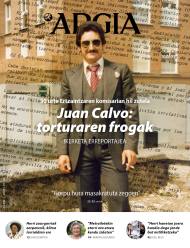Economic planning as the axis of alternatives
Economic alternatives have little space in official studies. In the eco-social crisis we have, they should be at the centre. In the curricula, subjects that do not guarantee short-term profitability have been marginalized, optional or, worse, missing from the program. This has happened in the economy, with the History of Economic Thought, the issue needed to understand the integrity of the economy. Many times, to learn about this, the path is to learn outside of academia, as happened to me, at ICEA or in Critical Economy associations.
This year I have had the opportunity to teach Economic History in the Bachelor of Business Administration and Management. It was no surprise, of the 431 pages of the handbook used as a basis, that only 9 pages were used to explain the planned socialist economic systems, and, of course, what stands out is their failure. The failure of capitalism will be for another edition. It is with this essence that planning (and by extension, socialism) is neither practical nor advisable in relation to dictatorships. To break these (ideological) limits, we brought to class the two socialist proposals (Marxist and libertarian), because we must teach economic history critically, but also to break a series of limitations that remain hidden under academic seriousness, stimulating reflection to think of models beyond capitalism.
As for planning, the model that is explained and repeated is that of the five years of the Soviet Union, but the truth is that the subject is much more complex and richer. In the collective subconscious, it persists that the market, with its errors, is better than planning; the first relates to freedom and the second to dictatorship. However, reality says just the opposite. Polanyi worked deeply on market freedom and the relationship between fascist dictatorships, highlighting the consequences of the Liberals’ economic proposals.
In view of the economic and social context that is being corrupted, the supposed solution being offered to us is to deepen the market, which is detrimental to the majority
We have models based on non-centralized economic organization plans that don't leave decisions to an elite or bureaucracy. Among them is the participative economy. It proposes a planned socialist decentralised economy. It bases the mechanism for structuring economic decisions on participation, not on prices. This proposal was born in the early 1990s to criticize central planning and flee capitalist models.
The proposal of Ziber Communism (CibCom) has been extended in the last decade. Among the proponents we find Marxist and libertarian communists. It bases the option of socialist economic planning on current technological conditions. It analyzes the institutional, economic and computational bases that would be necessary to democratically plan a socialist economy, to build viable and efficient. It is noteworthy that this approach does not correspond to the mere staging of the means of production, nor to the proposals of market socialism.
Faced with the economic and social context that is being corrupted, the supposed solution being offered to us is to deepen the market, which is detrimental to the majority. The democratic planning of the economy needs to be moved to the centre of the debate, by knowing and disseminating theory and practices.
Bidali zure iritzi artikuluak iritzia@argia.eus helbide elektronikora
ARGIAk ez du zertan bat etorri artikuluen edukiarekin. Idatzien gehienezko luzera 4.500 karakterekoa da (espazioak barne). Idazkera aldetik gutxieneko zuzentasun bat beharrezkoa da: batetik, ARGIAk ezin du hartu zuzenketa sakona egiteko lanik; bestetik, egitekotan edukia nahi gabe aldatzeko arriskua dago. ARGIAk azaleko zuzenketak edo moldaketak egingo dizkie artikuluei, behar izanez gero.
Life surrounds everything, it is limited and fragile. To live good lives, it seems to me that the body knows what to do, while the mind, although it knows (when it is well informed), often sees the body deliberately silence. In this silence the mind opens itself to relations... [+]
Eroso gaude ingurunea gure egoera fisiko/emozionalera egokitzen denean. Besteak ni kontuan hartu nauenean, izan gizaki bat, objektu bat, espazio bat. Erosotasunaren klabea produktu eta espazio diseinuan beharrizan handi gisa sartu da, erosotzat jotzen dena erosgarria delako... [+]
There are three knots that complicate our coexistence in the Basques, and for many years, despite our patience and determination, we are unable to break free from these ties. There are at least three knots of the moment: prisoners, Basque, immigrants.
With the new year we are... [+]
Nafarroa Arenan Mitoaroa ikusten izandako lagun batek “telurikotzat” jo zuen entzun-ikusi-sentitutakoa. Niri ere hala iruditu zitzaidan telebista medio etxetik hauteman nuena.
Pentsa daiteke Mitoaroak piztutako grinak eta atxikimenduak proiektuaren ikusgarritasuna... [+]
It is the habit of making decisions that will change our lives with the beginning of the new year. We make lists on three points: one, more sports practice; two, seeing old friends more often; three, going back to Iceland, real and metaphorically. As the months go by, we realize... [+]
Zirkulazioan lehentasunek garrantzi handia dute. Gidatzeko ikasten dugun lehen gauzatakoak dira: biribilguneak eta STOPak menperatu ezean nekez lortuko dugu gidabaimena.
Hala ere, lehentasunak ez dira kontu neutroak, eta historiak eta interes kontrajarriek aldatu izan... [+]
Since Benito Lertxundi, who told us that he will leave the scenes for ever, we have been there for several weeks, and since then many of us have felt orphans in one way or another, with a sense of loss or abandonment, sad. To Iruindarro, at least, we will remain forever honored... [+]
Today, January 21, is a day to remember and reflect on an interesting ephemeris of our recent history. It is 50 years since the lockdown of 47 workers from Potase in Navarre. This lockdown, which lasted fifteen days, caused a general strike in Navarre, the Department of the... [+]
A couple of weeks ago, a number of data from Norway was published. In this country of Northern Europe electric cars have predominated, being the Tesla brand the most sold, with 90% of recyclable energy consumed there. On the contrary, Norwegian public enterprises have no problem... [+]
These were my last words when we left, held hand in your deep breathing sleep. Your heart stayed forever without a special, simple, dignified pain. As you want and demand. How we want and respect.
Already a month before the arrival of winter, the last days of the longest night,... [+]
Today, the voices of women and children remain within a culture that delegitimizes their voices, silencing their experiences, within a system aimed at minimizing or ignoring their basic rights and needs. A media example of this problem is the case of Juana Rivas, but her story... [+]
On Tuesday, the sentence was released against five young people from Lapurdi, convicted of belonging to Segi. Fifteen months in prison for reversal to two young people, with a fine of EUR 500 each; 140 hours of forced labour and EUR 500 fine to two other young people; and,... [+]
The other day, as I was walking through the famous television series The Wire, there came a scene that reminded me of despair. There, the management of the newspaper The Baltimore Sun brought together the workers and alerted them to the changes that are coming, i.e. redundancies... [+]
The consumerist culture we live in sends every user to an unreasonable enjoyment. As Slavoj Zize says, Enjoy your fetish, it has become the rude mandate of hypermodernity. Current enjoyment is carried out through existing technological devices to occupy the place of fetish. But... [+]



















.jpg)